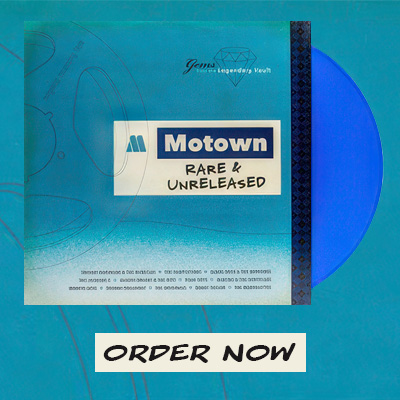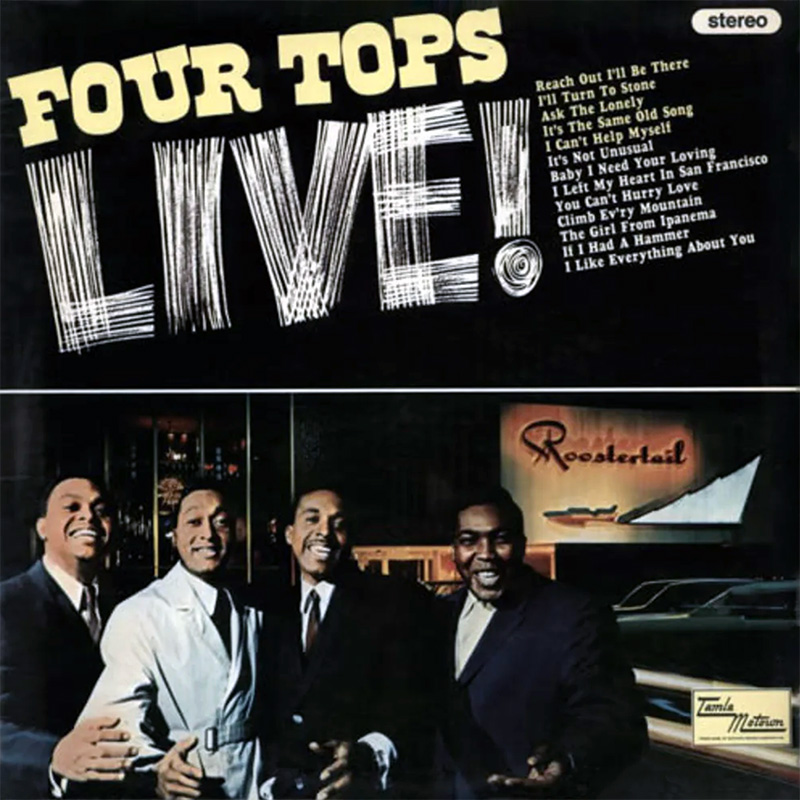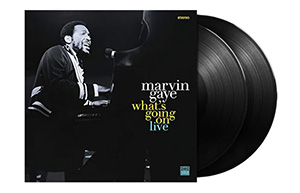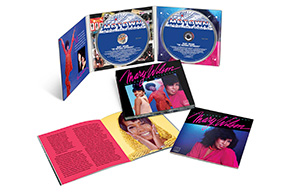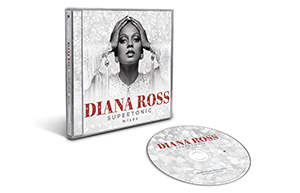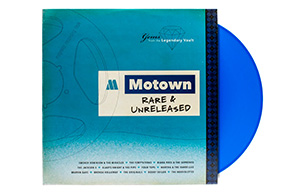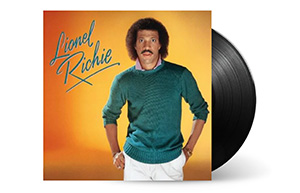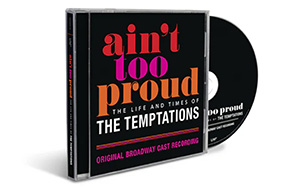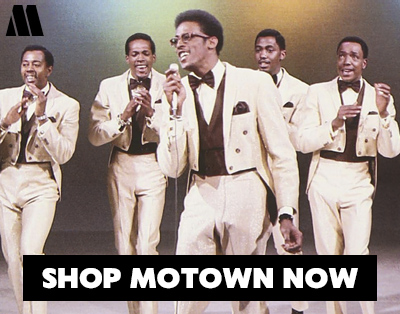The Four Tops: Four Tops Live!
Five reasons to listen to Four Tops Live!:
- Four Tops Live! is the first live album from a group hailed for its high-voltage concert performances.
- Dynamic versions of Four Tops chartbusters “Baby I Need Your Loving,” “I Can’t Help Myself,” “Reach Out I’ll Be There.”
- Recorded before a hometown crowd at Detroit’s riverside Roostertail club.
- The Tops’ take on “You Can’t Hurry Love,” “It’s Not Unusual” and more.
- Backed by Motown’s own Earl Van Dyke band.
Five fast facts:
- Original release date: November 1966.
- Four Tops Live! is the Four Tops’ fourth Motown album.
- Top 20 pop chart peak in the U.S. – and Top 5 in the U.K.
- Liner notes by Detroit radio star Scott Regen.
Full track listing:
In detail:
The Four Tops recorded this, their first live album, during two dates at Detroit’s prestigious Roostertail nightclub. The first, on Aug. 22, 1966, was only a matter of days after Motown shipped the single which came to redefine the group’s stature and reputation. That, of course, was “Reach Out I’ll Be There.” Released Aug. 18, it was No. 1 in the nation within weeks. But more than that, the record exemplified the Motown Sound’s mid-decade innovation and momentum – in particular, the breathtaking talent of the record’s creators, Holland/Dozier/Holland, and the vocal drama brought to it perfectly, uniquely, by the Tops.
The irony was that Levi Stubbs, Lawrence Payton, Obie Benson and Duke Fakir did not include “Reach Out I’ll Be There” in that first Roostertail set. Perhaps, only four days after release, the song was considered too new for the audience. Besides, the Tops were not short of past hits to offer: “Baby I Need Your Loving” (“our national anthem,” Levi tells the boisterous crowd), “Ask The Lonely,” “I Can’t Help Myself,” “It’s The Same Old Song.” So it was when the quartet returned to the club Sep. 11 that “Reach Out…” was featured and taped, together with other material, including their version of “You Can’t Hurry Love,” then at the peak of the Billboard charts.
The Four Tops were the first of seven acts presented in the now-celebrated “Motown Monday” series of shows at the Roostertail during the late summer and fall of ’66. The project was a collaboration between the record company, the nightclub and local radio station WKNR (“Keener 13”). The master of ceremonies was ’KNR disc jockey Scott Regen, an ardent Motown supporter. His is the voice that you hear introducing Four Tops Live! and, some 50 minutes later, closing it as the Tops vacate the stage, exhausted. Moreover, Regen presented a Keener 13 broadcast of each Motown Monday on his Saturday-night show, sponsored by Pepsi Cola.
The Roostertail was the Motor City’s premier supperclub, a two-floor venue planted at the edge of the Detroit River. Its main room was a conventional cabaret spot, presenting mostly middle-of-the-road stars (Tony Bennett, Bobby Darin, Peggy Lee) for adult audiences – although the Supremes had also played there in early 1966. The club’s so-called Upper Deck catered for a younger crowd, evidenced by the “Motown Monday” series. After the Tops, the following each played on a Monday night between Aug. 29 and Oct. 3: Jr. Walker & the All Stars, Marvin Gaye, Martha & the Vandellas, the Temptations, the Marvelettes, and Smokey Robinson & the Miracles.
The Tops’ shows at the Upper Deck were electric and exuberant, the audiences appreciative and excited. The album is proof positive that lead singer Levi was in fine form, while the group’s years of experience before a crowd is obvious from the stage patter. “Don’t applaud, throw money,” shouts Stubbs. “We have a few requests,” he jokes at another point, “but we’re not going to leave, we’re going to continue with the show.” When the foursome sing “It’s The Same Old Song,” Levi commands the room to accompany them: “Come on and help us out.”
Interpretations of non-Motown numbers worked well for the Tops, too. They croon “Climb Ev’ry Mountain” from The Sound Of Music, the musical with a movie soundtrack in the Top 10 at the time. “We murdered it the first show,” declares Levi, “we’re gonna bury it this one.” When they start harmonising Tony Bennett’s signature tune, “I Left My Heart In San Francisco,” Stubbs cracks, “I like San Diego better.” He knew the song well: it was among those the Tops cut during their first studio session for Motown in April 1963, only days after signing. The material was intended for release on the company’s Workshop Jazz label, but that plan was scrapped. Instead, the Four Tops made their debut on the Motown label with “Baby I Need Your Loving” in July 1964.
Back at the Roostertail, when the Tops turn in a six-minute take on Pete Seeger’s “If I Had A Hammer,” the result is more hootenanny than civil-rights clarion call. Even so, Levi makes mention during the song of a “union problem,” adding that “these guys” – which seems to refer to members of the band – “for some reason or another don’t like to play for colored performers.” If it’s a joke, it’s not clear, particularly as according to Scott Regen’s LP liner notes, the musicians are the Earl Van Dyke group, alias Motown’s own Funk Brothers. Then again, perhaps you had to be there.
That moment passes, and the Tops jump into a roof-raising finale with “I Can’t Help Myself.” Soon, they’re singing snatches of other hits (“Where Did Our Love Go,” Lee Dorsey’s “Ride Your Pony”) and calling up celebrities in the audience to the stage: Marvin Gaye, the Supremes, even the Everly Brothers, who had just completed a week at Detroit’s Gay Haven Supper Club. Listen closely and you’ll briefly hear the distinctive tones of Diana Ross, as the temperature climbs and the cheers grow louder. Then, in a track deployed on the LP as an encore, the Tops return the love with “I Like Everything About You.”
The Detroit Free Press favourably reviewed the Aug. 22 show. “The Four Tops on stage delivered their frantic, always-in-motion harmonies. Obie, Levi, Duke and Lawrence are in control of the 600 or so listeners and when they say, ‘clap your hands,’ hands get clapped – or they can bring it all to a whisper.” Earl Van Dyke’s musicians were praised, too. “This is a real band, using legitimate instruments, including two jazz flutes,” noted the newspaper’s Chuck Thurston.
The Top 20 impact of Four Tops Live! on the American pop charts was outclassed by the LP’s popularity in Britain, where it reached the Top 5, locked up a Top 10 slot for three months, and spent a total of 72 weeks on the best-sellers. The group made its U.K. concert debut in November 1966, followed by a nine-city tour – including two SRO shows at London’s Royal Albert Hall – in early ’67. One year later, when the Tops’ Greatest Hits was released in the U.K., it rapidly reached No. 1. The front cover art was different to that of the U.S. edition, which was all lettering; the British version featured a photo of the group, taken (where else?) in front of the Roostertail.
Scott Regen closes Four Tops Live! by reminding listeners “that every Monday there’s going to be a Motown Monday night here at the Roostertail.” The broadcaster remembers that he was picked to cheerlead the series by Berry Gordy and his marketing maven, Barney Ales. In addition to his consistent support for Motown at WKNR, Regen even wrote a song for the Tops, “Yesterday And You.” Today, he recalls the time that he was at Hitsville in 1970, dubbing in the group’s vocals: “And as Levi and the Tops were singing – singing and bringing their magic and meaning to my lyrics – my mind flashed back to the Roostertail, four years earlier, when Levi, while on stage, had me sing the lead line to ‘I Can’t Help Myself.’ I said to myself, ‘How amazing is this?’ ”
Just sayin’:
“Early on, the Tops made a commitment to each other that we would stay together, as long as we could sing and take care of our families. As the hits and the tours kept rolling, that’s what we did, because in those nine years before we got to Motown we really bonded; we found out we really loved and respected each other. As an outstanding lead singer, Levi could have gone elsewhere, and he was tempted many, many times, including an offer from Berry to play the male lead in Lady Sings The Blues. When Levi asked if there were parts for us, and Berry said no, he declined” – Duke Fakir, writing in the introduction to The Complete Motown Singles Vol. 12B.
Songwriters: George Cory, Douglass Cross, Vinicius de Moraes, Lamont Dozier, Norman Gimbel, Oscar Hammerstein II, Lee Hays, Brian Holland, Edward Holland Jr., Ivy Hunter, Antonio Carlos Jobim, Gordon Mills, Les Reed, Richard Rodgers, Pete Seeger, William Stevenson, R. Dean Taylor.
Pre-makes: “Climb Ev’ry Mountain” (Tony Bennett, 1959; Shirley Bassey, 1961)), “The Girl From Ipanema” (Astrud Gilberto & Stan Getz, 1964), “I Left My Heart In San Francisco” (Tony Bennett, 1962), “If I Had A Hammer” (The Weavers, 1950; Peter, Paul & Mary, 1962; Trini Lopez, 1963), “It’s Not Unusual” (Tom Jones, 1965), “You Can’t Hurry Love” (The Supremes, 1966).
Re-makes: “Ask The Lonely” (Billy Eckstine, 1967; Barbara Lewis, 1970; Vonda Shepard, 1998), “Baby I Need Your Loving” (The Fourmost, 1964; The Supremes, 1966; Gene Pitney, 1968; Frankie Valli, 1975; Carl Carlton, 1982; Lisa Stansfield, 1999; Michael McDonald, 2004; Lulu, 2005), “I Can’t Help Myself” (Johnny Rivers, 1966; Donnie Elbert, 1972; Joe Stampley, 1973; Bonnie Pointer, 1979; Dolly Parton, 1984; Human Nature, 2006), “I’ll Turn To Stone” (Dennis Edwards, 1967; Jackie DeShannon, 1968; Barbara Randolph, 1968), “I Like Everything About You” (Chris Clark, 1966; Chuck Jackson, 1967), “It’s The Same Old Song” (Delroy Wilson, 1972; Wild Cherry, 1978; Third World, 1989; Boyz II Men, 2007; Rod Stewart, 2009; Iron and Wine, 2015), “Reach Out I’ll Be There” (Petula Clark, 1967; Diana Ross, 1971; Gloria Gaynor, 1975; Average White Band, 1982; Thelma Houston, 1983; Narada Michael Walden, 1983; Michael Bolton, 1992; Michael McDonald, 2004; Human Nature, 2005; Boyzone, 2014).




